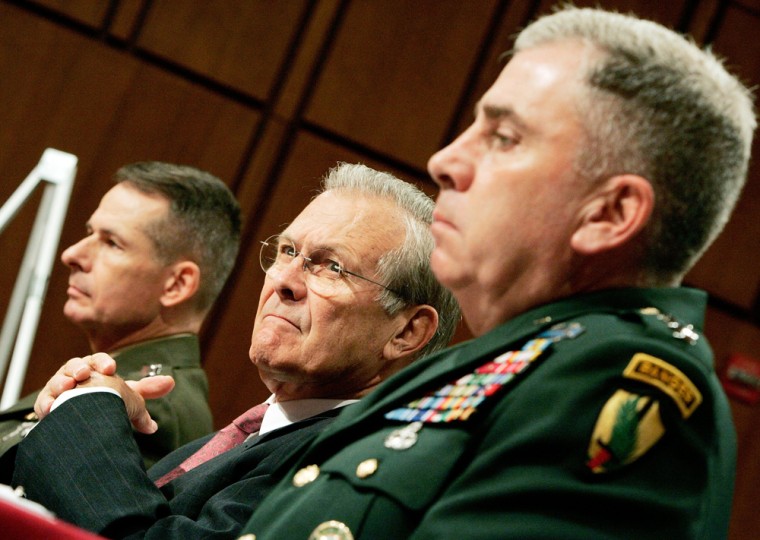As Defense Secretary Donald Rumsfeld acknowledged Wednesday that sectarian violence in Baghdad has surged in recent weeks, Sen. Hillary Clinton criticized him for “presiding over a failed policy.”
Clinton confronted Rumsfeld and fellow Pentagon senior Gen. John Abizaid, the top U.S. commander in the Middle East, during a hearing held by the Senate Armed Services Committee.
“Because of the administration’s strategic blunders and frankly the record of incompetence in executing, you are presiding over a failed policy,” said Clinton, D-N.Y., a possible 2008 presidential candidate. “Given your track record, Secretary Rumsfeld, why should we believe your assurances now?”
“There’s no rule book; there’s no history for this,” Rumsfeld said. “And the judgments that have been made have been made by exceedingly well-trained people.”
He denied that he had ever “painted a rosy picture” of the situation in Iraq, and conceded the insurgency is an ever-increasing problem.
Abizaid, echoing Rumsfeld, told the committee Thursday that “Iraq could move toward civil war” if the violence is not contained.
“I believe that the sectarian violence is probably as bad as I have seen it,” he said, adding that the top priority in Iraq is to secure the capital, where factional violence has surged in recent weeks despite efforts by the new Iraqi government to stop the fighting.
General: Up to Iraqis to avoid civil war
Gen. Peter Pace, chairman of the Joint Chiefs of Staff, told the panel that “we do have the possibility of that devolving into civil war.” He added that this need not happen and stressed that ultimately it depends on the Iraqis more than on the U.S. military.
“Shiite and Sunni are going to have to love their children more than they hate each other,” Pace said, before the tensions can be overcome. “The weight of that must be on the Iraqi people and the Iraqi government.”
President Bush and Rumsfeld have steadfastly refused to call the situation in Iraq a civil war, although Rumsfeld, at a news conference on Wednesday, acknowledged that the violence is increasing.
The commanders’ remarks about the threat of a civil war came just three months before congressional elections in which Bush administration policy in Iraq looms as a defining issue. Many voters have tired of the 3-year-old war, which has cost more than 2,500 U.S. lives and more than a quarter trillion taxpayer dollars.
No big troop reduction
They also come at a time when thanks to the high level of violence in Baghdad, administration hopes have diminished of significantly reducing the U.S. force in Iraq, which Rumsfeld said currently totals 133,000. Last year, Army Gen. George Casey, the top U.S. commander in Iraq, expressed hopes of significant troop cuts this year, comments that Abizaid seemed to temper on Thursday.
“Since the time that General Casey made that statement, it’s clear that the operational and the tactical situation in Baghdad is such that it requires additional security forces, both U.S. and Iraqi,” Abizaid told Sen. Carl Levin of Michigan, the top Democrat on the committee.
“It’s possible to imagine some reductions in forces, but I think the most important thing to imagine is Baghdad coming under the control of the Iraqi government,” Abizaid said.
Later in the hearing, the general expressed confidence that the Iraqi government is moving in the right direction.
Possible to prevent civil war
“Am I optimistic whether or not Iraqi forces, with our support, with the backing of the Iraqi government, can prevent the slide to civil war? My answer is yes, I’m optimistic that that slide can be prevented,” Abizaid said.
Bush last week approved an increase in the number of U.S. troops in Baghdad as part of a new effort to help Iraqi security forces get a grip on the sectarian tensions.
Abizaid also said under questioning that it was possible that U.S. casualties could rise as a result of the battle to contain sectarian violence in the capital.
“I think it’s possible that in the period ahead of us in Baghdad that we’ll take increased casualties — that’s possible,” he said.
Rumsfeld, who testified alongside Abizaid and Pace, did not comment directly on the prospect of civil war but said Iraq’s future lay in the hands of Iraqis, beginning with a reconciliation process that has yet to get under way.
“Ultimately the sectarian violence is going to be dealt with by Iraqis,” Rumsfeld said.
Pace said he did not anticipate one year ago that Iraq would now be in danger of plummeting into civil war. Abizaid said it was obvious a year ago that sectarian violence was on the rise, and that Iraq’s police forces did not develop as well as U.S. officials had expected.
“It’s vital that we turn this around,” the general said.
Pressed about the prospect of reducing U.S. troop levels in Iraq, Rumsfeld stuck to his usual assertion that it depends on conditions and on the ability of the Iraqi government to suppress sectarian tensions. He said the Pentagon is seeking a careful balance between having too few troops and having too many.
“That’s a fair tension there,” Rumsfeld said.
